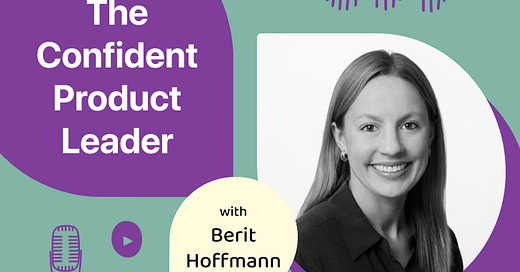In this issue of The Confident Product Leader, we talk with Berit Hoffmann, a product leader with extensive experience in large enterprises and startups. She shares her journey into leadership roles and provides valuable insights into influencing without formal authority—a skill that every aspiring and growing product leader should master.
Taking Charge Before the Title
Berit's journey into leadership started in an unconventional but powerful way. She shared how she consciously decided to take on leadership responsibilities at a critical moment in her career before receiving the formal title. At the time, she worked at a startup called Bebop, which Google had acquired. With no head of product officially in place, Berit noticed a lack of cohesion in how the team thought about launch readiness, messaging, and integration. This gap presented an opportunity, and Berit decided to step up.
She began acting as a leader, ensuring all aspects of the product came together cohesively, even though she had no official authority. This proactive approach eventually led to her being formally recognised in a leadership role. Reflecting on this experience, Berit emphasised that leadership is often about seeing a gap, stepping into it, and being willing to "do the job before you're given the job." The lesson here is clear: if you want to grow into a leadership position, start leading where you are, the title will follow.
The Art of Influencing Without Authority
One of the most valuable lessons from Berit is her approach to influence. Product managers are often described as "CEOs of the product," but without direct control over many teams they work with. This means learning to influence without authority is critical. Berit shared two key strategies that helped her develop this skill:
Understand What Matters to Others: Berit suggests that to influence someone, you should deeply understand what problem they're trying to solve. Whether it’s a senior executive or a peer, you must know what keeps them up at night and frame your ideas to align with their priorities. She emphasises that this isn’t about being transactional. It’s about genuinely understanding their perspective and finding ways to help solve their problems. This empathy-driven approach makes your message more compelling and builds trust.
Draw Out Objections Early: Early in her career, Berit thought that silence meant agreement. Now, she knows better. She actively seeks out concerns and objections as early as possible. "The sooner I can identify and draw out concerns, the sooner I can either adapt my approach or address misunderstandings," she says. This strengthens her proposals and ensures smoother execution down the line, as all stakeholders feel heard and understood.
Leadership Isn’t About Titles
Berit’s story highlights an important truth: leadership isn't about your title but your ability to create alignment, solve meaningful problems, and bring people along on the journey. As a leadership coach, I see more successful leaders hone the skill of influencing without needing their authority. This separates good leaders from great ones.
Advice for Emerging Product Leaders
When asked for advice from product leaders looking to improve their influencing skills, Berit shared a critical insight we have heard before at The Confidence Product Leader: Stop trying to "convince" others. Drawing out objections, understanding concerns, and then using that information to adjust your approach or strengthen your messaging is far more effective than simply debating your point of view. As a previous guest, Danny Beck, said, “Seek the best answer, not your answer”.
In my experience, true influence comes from collaboration and understanding, not from winning arguments.
What are you waiting for, step up
Berit Hoffmann’s journey offers a blueprint for emerging product leaders who want to grow their influence. Step up before you're given permission, focus on understanding others’ perspectives, and actively draw out concerns to refine your approach. These skills will help you lead without authority and earn the respect and trust of those around you.
If you found Berit’s insights valuable, consider how you can apply these lessons in your current role. What gaps can you step into today? How can you better understand the needs and concerns of those around you? Start leading now, and the title will come later.




